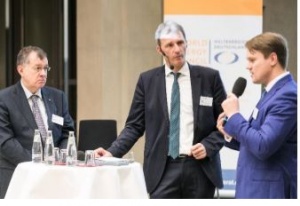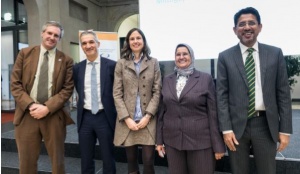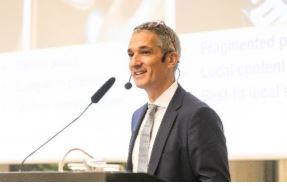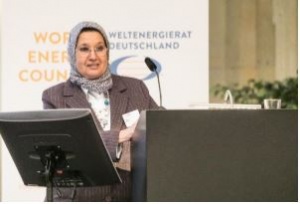In his welcoming address, Dr Uwe Franke, President of the World Energy Council - Germany, stressed that no country alone can create a sustainable, affordable, secure energy system. “Trends and innovations do not end at national borders, nor do CO2 emissions or energy itself”, and argued in favour of strong international cooperation.”
During four interactive keynotes, participants at the Energy Day embarked on a journey through various continents.
“The transport sector will be one of the most difficult ones when it comes to decarbonising future energy systems. Limiting global warming to a maximum of 2°C requires extraordinary and sustained efforts that go far beyond the commitments already made and entail very high coal prices. Global cooperation and trade, coordinated climate policy and technological innovation are necessary to balance the energy trilemma.”
California Energy Commissioner, David Hochschild, stressed in his keynote speech that the Californian state will not support the Trump administration's move to withdraw from the Paris Climate Agreement. Instead, he wants to do his utmost to push ahead with the path already taken towards a climate-friendly energy supply based on renewable energies.
The aim is to increase the share of renewable energies, which already account for around 30 percent, to 50 percent by 2050 – although the target is expected to be reached 5 to 10 years earlier. This progress is due to constantly falling prices for clean energy technologies. The transport sector is also changing: In California, almost 350,000 electric vehicles are now on the road - a share of 50 percent within the entire USA - with a strong upward trend.

Since 2016, all households have had access to smart grids and smart meters. Dynamic contracts (prices vary by the hour) and access to smart apps allow the management of the individual power consumption in real time. Network failures were reduced by 20 percent. Customer interaction decreased by more than half, while customer satisfaction doubled. Estonia's progress in digitisation is the main driver of the energy sector`s rapid changes.
A Slido poll on digital solutions, which was launched as a starting point for the discussion, showed that more than half of the participants of the Energy Day would be prepared to use Smart Home products and E-Government. Only just under a quarter expressed concerns about data protection.
However, the different national interests within and outside the European Union pose a constant challenge to common energy and climate policy. When asked about the prospects for the European energy market in 2030, the parties agreed that a "multi-speed Europe" and various multilateral agreements would be decisive.
The day ended with a discussion on how the governments of the various EU Member States that have recently been elected (France, Great Britain, the Netherlands, Germany) and those that are about to be elected (Italy) will push ahead with their national energy and climate policies.
Moderator Sonja van Renssen, Brussels correspondent of the "Energy Post", discussed with Tim Figures, EU Policy Advisor to the Secretary of State for Business, Energy and Industrial Strategy, UK; Stefan Kapferer, Chairman of the Board of BDEW e. V.; Prof. Dr. Coby van der Linde, Director of the Dutch Clingendael International Energy Programme; Marco Margheri, Executive Vice President for Institutional Affairs Edison S.p.A and Chair of the WEC Italy; and Jean Eudes Moncomble, Secretary General of WEC France.
Among other topics, the various goals and measures of the individual countries, the possibilities for a long-term phase-out of electricity production from fossil fuels and the situation in Europe after the Brexit decision were discussed.
The participants agreed that the more the EU states cooperate in the energy and climate field, the more successful and efficient they will be, the more innovations and learning curves can be shared. Concrete measures by individual countries can be disputed, but there should be no doubt about the determination to climate protection itself.
Interactivity with the audience was ensured by interspersed live surveys on the Slido.com website.








